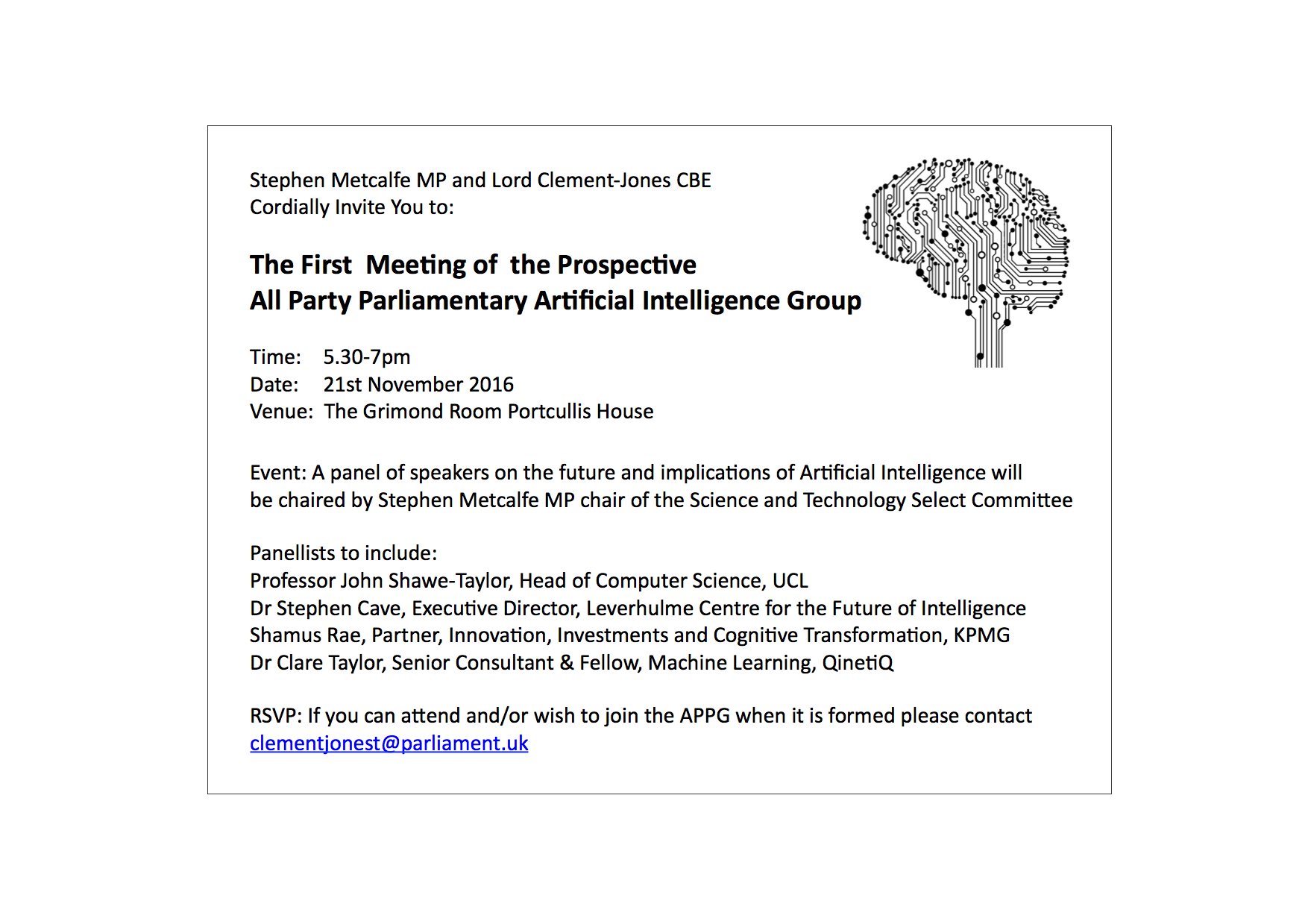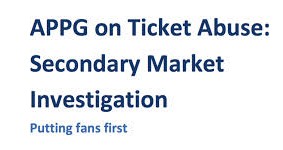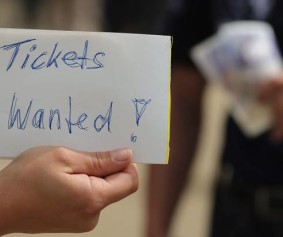New All Party Parliamentary Artificial Intelligence Group Being Formed
Lord C-J argues for ticket abuse legislation
In the recent 2nd Reading Debate on the the Consumer Rights Bill I argued strongly for new legislation to prevent ripping off of consumer by secondary ticketing sites as suggested recently by the All Party Ticket Abuse Group.
see here
http://www.publications.parliament.uk/pa/ld201415/ldhansrd/text/140701-0001.htm#14070156000078
"There is then the whole question of ticketing abuse. Increasingly—as Channel 4’s “Dispatches” investigation and the BBC’s “Watchdog” have shown—professional secondary ticketing touts buy tickets solely with the intention of denying them to real fans, to whom they then resell their tickets at inflated prices.
With internet ticket selling becoming more streamlined, touts are able to use sophisticated computer systems to buy large volumes of tickets automatically, seconds after they go on sale. That often means that it is practically impossible for genuine fans to access the event. An artificial shortage of tickets and an inflated secondary market are created. Content providers gain no share whatever of the inflated prices charged.
As the All-Party Group on Ticket Abuse—of which I am a member—noted, that market does not adhere to the same principles of transparency and consumer protection as other markets. Members of the group believe, as I do, that the large-scale, unauthorised resale of event tickets is against the interests of both consumers and content creators. We believe that the solution is greater transparency in the secondary market and a greater ability for event holders to control who can resell their tickets. The Metropolitan Police report drawn up by Operation Podium after the Olympic Games stressed the need for an open and transparent system for ticket reselling, with clear and appropriate regulations. Secondary websites should be required to publish full details of the ticket being offered, including the original face value, seat number and location. They should identify the seller, state whether or not the seller has the permission of the originator to resell the ticket, and declare where the tickets are being listed by the event organisers."
Government Agrees with Peers to Put Fans First
Earlier this year the Coalition Government agreed a compromise on the Consumer Rights Bill with proponents of transparency measures to prevent ticket fraud and by secondary ticket sellers.
As a signatory to the original amendment and a member of the All-Party Group on Ticket Abuse I paid tribute to Lord Moynihan, Sharon Hodgson MP, Mike Weatherley MP and Lady Heyhoe Flint for their roles in the campaign and their for their efforts in securing this agreement, which will benefit music and sports fans immensely.
Here is what I said:
http://www.publications.parliament.uk/pa/ld201415/ldhansrd/text/150224-0001.htm#15022465000505
We are now waiting for the new Conservative Government to set up the review of the law governing Secondary Ticketing as promised in the last Parliament and enshrined in the Consumer Rights Bill. I asked a question in the Lords about this recently and this is the reply I received
To ask Her Majesty’s Government when they intend to commence the review of the consumer protection measures for the secondary ticketing market under section 94 of the Consumer Rights Act 2015; and who will undertake it.
The Parliamentary Under-Secretary of State, Departments for Business, Innovation and Skills and for Culture, Media and Sport (Baroness Neville-Rolfe) (Con): My Lords, work on appointing the chair and expert group is well advanced and the review will proceed once this and the terms of reference are finalised. We are aware of our statutory obligation to publish a report on its findings by 26 May 2016.
Lord Clement-Jones (LD): My Lords, I thank the Minister for that reply but ticket fraud continues to soar this summer. Circle Tickets has defrauded hundreds of music fans just this June while the RFU reports zero compliance with the Act for World Cup tickets, so the problem remains acute. This review is enshrined in statute as a result of the efforts of the noble Lord, Lord Moynihan, and others only recently. We are now two months out from the general election. When will this review start, will BIS or the DCMS oversee it and what will its scope be?
Baroness Neville-Rolfe: My Lords, as I have said, we will publish details of the review shortly. I share the noble Lord’s disappointment on the enforcement side and, prompted by his Question, I spoke to the City of London Police only last week. I was reassured about some of the actions it is taking, both on its own and with the cultural and sporting bodies, for the important events of this summer. As the noble Lord
Here is the original piece I wrote after the vote in the Lords in November
The House of Lords has handed a big boost to music, sport and comedy fans as a cross-party coalition of Peers yesterday passed an amendment to curb the actions of ticket touts.
In a defeat for the Government, Peers forced through a new clause to the Consumer Rights Bill to increase transparency in the ticket resale market.
The new provisions, passed by 183 votes to 171, will mean that touts selling their tickets through major internet platforms like Seatwave and Viagogo will have to prominently disclose key facts to potential customers, including:
- Their identity, particularly where they are selling tickets as a business;
- The original face value of the tickets being sold;
- The individual characteristics of the tickets being sold, such as the seat number or the booking reference, and;
- Whether the terms and conditions on the ticket mean that it can be cancelled if the organisers find out it has been resold.
It is hoped that the information being made public will enable event holders to identify the largest ticket touts and prevent them from buying up large quantities of tickets to re-sell, leaving ordinary fans with no choice but to pay inflated amounts on the secondary market.
The latest high-profile tour to be affected is that of Fleetwood Mac, with thousands of tickets being resold on the secondary market at way above face value within minutes of the tour selling out. Similarly, next year’s Rugby World Cup has been plagued by touts reselling tickets to England games.
The amendment follows a similar attempt in the Commons earlier in the year. Both amendments were informed by a report from the All-Party Parliamentary Group on Ticket Abuse, which held an inquiry at the beginning of the year into the secondary ticketing market.
Liberal Democrat Peer and signatory to the New Clause, Lord Tim Clement-Jones, said: “This is a victory both for the ticket-buying public and for the hugely important live event industry. The Police and the entertainment industry have been clear that action needs to be taken on ticket touts to ensure that genuine fans can get access to gigs, shows and games without having to pay extortionate prices, and these new measures would do exactly that.”
Labour Co-Chair of the All-Party Parliamentary Group on Ticket Abuse, Sharon Hodgson MP, said: “Ticket touts have operated with impunity for far too long. In no other market would we put up with not knowing who we were buying from or whether they even had permission to sell us a product. This amendment is a significant step towards tackling the scourge of touts and putting fans first, and I hope that the Government now listens to the will of Parliament.”
Conservative Co-Chair of the All-Party Parliamentary Group on Ticket Abuse, Mike Weatherley MP, said: “It’s been clear for a long time that this market is not working in the interest of genuine fans or the people who put in all the hard work and investment to put on live events. Anyone operating honestly has nothing to fear from these changes, but they will make a big difference for ordinary fans. It’s imperative that the Government doesn’t try to reverse this amendment when the Bill comes back to the Commons.”
See the Report in the Evening Standard
All Party Group debates the future of pharmacy
I recently spoke on a Panel at the All Party Pharmacy Group on 11th September about the the Future of Pharmacy.
Here is what I said:

Pharmacy in Britain is an incredible resource. I am a fan of pharmacy. It is often able to respond quickly and effectively to the consumer/customer/patient and to the right incentives.
It's called community pharmacy and the best pharmacies really are part of the community.
Some 10% of the NHS budget, when considering drug costs is channeled through community pharmacists
In the UK there are over 47,0000 registered pharmacists and over 21,800 pharmacy technicians. Of which there were 38,867 registered pharmacists and 18,165 pharmacy technicians in England last year.
The NHS Business Services Authority reports show that there were 11,236 community pharmacies in England at 31 March 2012.
That means there has been an increase from 9,500 of 15.3 per cent since 2002-03.
This compares to 10,000 GP general practices in England.
Of these 11,236, 61% are owned by multiples, that is they are in a chain of five or more.
They dispensed some 885.0 million items annually across England compared to 566.3 million in 2002/3.
So we have had huge growth in number of pharmacies over the past few years particularly as a result of the scheme to encourage new pharmacies that offer 100 hours a week to open.
That growth won’t continue.
Student Numbers
As former chair of the School of Pharmacy I have a strong interest in this area.
The Centre for Work Force Intelligence (CfWI) has now published a report on pharmacy workforce and student numbers which shows that by 2040 there will be an over supply of pharmacists of between 11,000 and 19,000. They recommend a staged approach to managing these numbers.
There has been a huge increase in graduate numbers with the expansion of schools of pharmacy in England from 12 to 21 in between 1999 and 2009, with several more opening or due to open.
This is not just due to new school of pharmacy opening, but also an expansion in numbers by the established schools. For example, several universities have a campus in Malaysia which swells their final year cohort. For example, Nottingham have around 300 students there.
This means too many graduates coming through the system from both the new and established schools. The number of undergraduates at any one time has gone from 4200 in 1999 to over 9800 in 2009. In the 2011/12 academic year there were 10,951 pharmacy students and 3,104 entered MPharm programmes in England .
This not only places pressure on clinical placements and academic resource but on preregistration places in pharmacies These are wholly within the control of employers –despite the investment made by the DoH – and are becoming much more scarce. NHS pre-registration training positions are falling too.
So we have a major issue now with an over supply of graduates from our schools of Pharmacy.
How do we ensure that we have the right number? How do we ensure that the education they undertake and the debts that they incur gives them the clear prospect of employment
This is under debate. BiS and DoH are in discussion about how numbers can be regulated with HEFCE the GPhC the RPS and the schools of pharmacy. At the request of the government, The Higher Education Funding Council for England (HEFCE) and Health Education England (HEE) are consulting on the supply of pharmacy graduates in England.
The consultation started on 2nd September, 2013 and will run until the 15th November, 2013.The HEFCE/HEE joint consultation proposes three options:
- To continue to allow the market to determine the number of pharmacy graduates
- To introduce an intake control at each university for entrants to MPharm pharmacy programmes
- To create a break-point during study which enables some students to graduate with a Bachelor of Science degree and others to progress through further study to qualify as registered pharmacists
Which option do we chose given that the market seems not to be delivering an acceptable solution?
Controlling the entry numbers is the medical nursing and dentistry option. But who is going to do that and how?
Neither HEFCE nor GPhC appear to want to do this.
It might even be preferable rather than spreading pain across all schools to licence certain schools to deliver the MPharm and or the Bsc on the basis of quality. Could the GPhC take this on?
Even if a cap on student numbers were to be implemented tomorrow, there will still be a 5-6 year lag in the system.
As regards the actual content of the MPharm we have had an increasingly well qualified graduate population especially over the last 10 years.
The MPharm coursescould be even better.
A review conducted for Medical Education England proposed an integrated 5 year course including a much greater clinical content with a strong contribution from employers as the 5 years would include 2 practice placements.
Joint sign off by the HEI and the employer would be needed to graduate.
Past Initiatives
Currently however it is arguable they are over educated for what they do.
We need to use our pharmacists to better clinical effect particularly in primary care.
This is not to say that successive governments and the pharmacists themselves have lacked ambition .
Many of the initiatives taken involving pharmacy don’t get buy in from GP’s. For example the latest statistics available (28 June 2013) show that 90% of pharmacists can receive electronic prescriptions but only 10% of GP’s are in a position to prescribe this way.
Pharmacists have invested money in consulting rooms but many have yet to see a return.
Whether initiatives have been effective seems to depend on whether a service is centrally mandated or at local discretion.
Contrast centrally funded Advanced Services eg New Medicines Services and Medicines Use Reviews with Enhanced Services such as Obesity initiatives locally commissioned by CCGs and formerly by PCTs.
MUR’s were introduced in 2005 under the new contractual arrangement for pharmacy under the Labour Government-and far better in their impact than the GP’s equivalent -are conducted by community pharmacies. Compared to 2.1 million in 2011/12.
A total of 2.4 million Medicines Use Reviews (MUR) were conducted by community pharmacy contractors in England in 2011-12, compared to 2.1 million in 2010-11, an increase of 325,524 (15.4 per cent).
Enhanced services by contrast have been a great aspiration but how successful have they really been?
Local enhanced services –which are at the discretion of PCT’s/CCG’s have actually decreased. The number of local enhanced services provided by community pharmacies in 2011-12 decreased by 1,679 (5.4 per cent) to 29,283 since 2010-11
Of the twenty services commissioned by PCTs the most commonly commissioned services in 2011-12 were Stop Smoking (19.2 per cent), Supervised Administration (19.1 per cent), Minor Ailment Scheme (12.1 per cent) and Patient Group Direction (11.9 per cent).
So we need to be very careful about we fund and configure services for the future.
The Future
As AT Kearney’s recent study shows however the winds of change are blowing.
What it calls the five forces for change are on the way which will inevitably mean closure of significant numbers of pharmacies.
- Squeeze on healthcare budgets
- Intensifying competition
- Transformation of the supply chain
- Emergence of new alternative channels
- Demand for convenience and expertise
Kearney says that in the face of these forces pharmacies can build on their trusting relationships with customers to become a front line point of care.
Unless we invest wisely in community pharmacy now, and build intelligently on the heritage of NHS community pharmacy and GP practice and if too much future investment goes into bigger secondary institutions rather than truly local facilities we will not gain the advantages of the new technologies now being introduced in medicine and IT.
We need to recognize the people want much more control over their own health. They want information and professional advice and support to be able to make choices. The classic change from Klein’s Church to Garage model! How do we best deliver what is called self care?
Change is under way in the pharmacy already. The future is robots on the one hand for dispensing and diagnostics and other skilled preventive and medicines management roles on the other.
The fact is that with reduced budgets and generics pharmacists will have to focus on services rather than products.
Do we need in effect a new breed of apothecaries as suggested in a recent paper with a much stronger clinical role going beyond diagnostics and health checks?
In the end this will be good for patients and the pharmacy profession
Our current primary care system is not designed to deal effectively with public health issues. We need much greater emphasis on prevention. Despite the experience of Enhanced Services we need major action on Smoking, diabetes, hypertension.
We need much better ways too of dealing with minor ailments.
Then there is the management of long term conditions allied to supporting independent living at home. The demographics mean that more older people living longer. 50% of the population will be over 50 by 2024.
With scarce resource Medication Therapy Management (MTM) will become even more important. We need to find effective ways of supporting NICE’s Guidelines on Adherence
Research by Prof Rob Horne and Professor Nick Barber at the School of Pharmacy, UCL shows that 50% of medicines not being used to best effect.
Some regarded the MUR’s as little more than a chat.
So the New Medicines Service was introduced as a result of this UCL School of Pharmacy research in 2011 to help support patient taking a new medicine and involved pharmacists phoning patients a week after starting an new medicine to check that they are adherent.
Pharmacy could contribute greatly to all these issues as the so called Third Pillar of Health care.
The new RPS Faculty has the potential to be an important development for the profession. The RPS launched it earlier this year, and it is in essence an accreditation structure for the profession, allowing those in practice to develop their clinical skills and become recognized for their achievements.
This recognises that Propper and more clinical use of pharmacists could lead to a massive reduction in hospital admissions and the productivity savings the NHS desperately needs but seems unlikely to achieve.
For much of this pharmacists will need appropriate access to health records.
Much will depend on the ability to collaborate with GP’s.
Why does it seem that GP’s are so reluctant? Do GP’s want to be want to be the gateway for everything even for preventive health care, self care , minor ailments and medicines management for which pharmacists are ideally suited?
Pharmacists need to operate more more flexibility too.
The greater use of technicians and more flexible contracts instead of locums.
How about new pharmacist staffed Community Health Centres.
Maybe pharmacists should be given a more explicit out of hours role.
This all leads to the question of how much professional freedom we give to the pharmacists.
My view is that the pharmacist of the future with the developments underway in pharmacy education mean that pharmacists will be well able to undertake much more clinical responsibility and we must encourage it. I hope this will be in cooperation with GP’s.They crucially need to move with times too.
There are some positive signs here as I see that the head of the dispensing doctors association Richard West is very positive about the role that pharmacists can play in reducing GP workloads.




